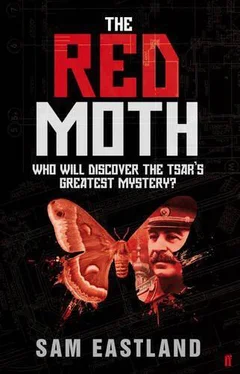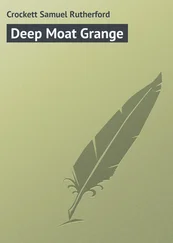Sam Eastland - Red Moth
Здесь есть возможность читать онлайн «Sam Eastland - Red Moth» весь текст электронной книги совершенно бесплатно (целиком полную версию без сокращений). В некоторых случаях можно слушать аудио, скачать через торрент в формате fb2 и присутствует краткое содержание. Жанр: Исторический детектив, на английском языке. Описание произведения, (предисловие) а так же отзывы посетителей доступны на портале библиотеки ЛибКат.
- Название:Red Moth
- Автор:
- Жанр:
- Год:неизвестен
- ISBN:нет данных
- Рейтинг книги:3 / 5. Голосов: 1
-
Избранное:Добавить в избранное
- Отзывы:
-
Ваша оценка:
- 60
- 1
- 2
- 3
- 4
- 5
Red Moth: краткое содержание, описание и аннотация
Предлагаем к чтению аннотацию, описание, краткое содержание или предисловие (зависит от того, что написал сам автор книги «Red Moth»). Если вы не нашли необходимую информацию о книге — напишите в комментариях, мы постараемся отыскать её.
Red Moth — читать онлайн бесплатно полную книгу (весь текст) целиком
Ниже представлен текст книги, разбитый по страницам. Система сохранения места последней прочитанной страницы, позволяет с удобством читать онлайн бесплатно книгу «Red Moth», без необходимости каждый раз заново искать на чём Вы остановились. Поставьте закладку, и сможете в любой момент перейти на страницу, на которой закончили чтение.
Интервал:
Закладка:
‘Never mind that‚’ answered Kirov. ‘What was Churikova doing here?’
Golyakovsky struggled to recall. ‘It was something to do with viscosity.’
‘Viscosity? What does that have to do with studying art?’
‘Well, I don’t know exactly. Polina was in a special programme devoted to art forensics. Finding out forgeries and so on. They often requested samples of paints and varnishes from works that arrived in our collection already damaged beyond repair. Sometimes, even though the paintings can’t be salvaged, we are able to reuse the frames.’
‘Why did they want paint samples?’
‘To determine their chemical composition. From that, they could often tell when a painting had been made. Some forgeries use colours that weren’t invented until centuries after the paintings were supposed to have been made. But that’s not always something you can tell just by looking at it. You have to be able to look at its chemical structure.’
‘This document also gives her permission to enter the archives.’
‘Yes. That means she was allowed to search in our inventory for particular samples on which to conduct scientific research. She couldn’t just walk out with it, you understand. It all had to be approved. I took charge of that personally.’
‘And what did she want for this experiment in viscosity?’
‘Well, it seemed very strange,’ he began, ‘but the whole business of forensics is strange to me.’
‘What did she want?’ repeated Kirov.
‘She asked for some samples of glue.’
‘What kind of samples?’
‘If I recall correctly, she wanted glue dating from several different time periods and from a number of different origins. A large part of our work here involves restoration, and glue is used extensively, not only in the repair but also in the creation of many original art works. If we don’t know what we’re dealing with, we might end up destroying the very things we’re trying to fix. Throughout history, glues have been made of different substances. These glues, in their original state, have different viscosities, or liquidity. If a glue used in the fabrication of a sixteenth-century cabinet turned out to be a modern synthetic compound, its lack of authenticity could be established.’
‘And what do the figures on the other side represent?’ asked Kirov.
Golyakovsky turned over the page. ‘These must be the results of her experiment. This refers to temperature.’ Golyakovsky pointed to a small circle at one end of the graph. ‘And this,’ he dragged his finger across to the backwards Latin U, ‘is the symbol for viscosity. It looks as if she was running an experiment with different kinds of glue to determine what effect heat would have on their liquidity. You see, once a glue has hardened, it forms a bond between two surfaces, but its original adhesive qualities are lost. It is no long sticky, if you see what I mean. Over time, the original compound can become brittle and the bond can fail if it is put under stress. The heat used here was to revive the glues.’
‘To see if they would become sticky again?’
‘Exactly. Now it looks as if most of these glues didn’t respond, but this one did.’ He touched one of the lines, which banked steadily upwards at the open end of the graph.
‘What was it made of? Can you tell?’
Golyakovsky shook his head. ‘Not entirely. Their chemical compounds are partially listed. It’s not a synthetic‚ I can tell you that much. My guess is that it’s quite old, containing something like beeswax and ichthyocolla.’
‘Ichthyo- What?’
‘Fish bladders. Makes you wonder how they figured that one out, doesn’t it, Major?’
‘Would there be any reason for her to keep this information secret?’
Golyakovsky shrugged. ‘Not that I can think of. Her findings were never restricted.’
Kirov explained how he came across the message. ‘Whatever this is, she didn’t want anyone else to know about it.’
Golyakovsky frowned in confusion. ‘But it’s just glue. It’s not as if there is a shortage of the stuff. If it had been something precious, I would understand, but. .’
Golyakovsky continued to talk, but his words seemed to grow fainter and fainter as an idea crested like a wave in Kirov’s brain. ‘Thank you, Comrade Golyakovsky,’ he interrupted. Then, under the piercing gaze of saints whose bones had turned to dust five hundred years before, Kirov turned and sprinted for the exit.
With their nerves beginning to fray
With their nerves beginning to fray‚ Pekkala and Stefanov sat on the floor of the cold and empty cottage‚ waiting for Churikova to arrive with the professor. Outside‚ darkness crowded against shuttered windows.
For Pekkala, the absence of furniture made the interior seem much larger than he had remembered, and every breath seemed amplified without the dampening effect of carpets on the floors. Although the house was not dirty, or showing any signs of disrepair, the grey haze of spider webs in the windows told Pekkala that the place had not been lived in for some time. There was a stillness in the air which made him think the place had been abandoned since he’d left it more than twenty years before.
Reaching down his shirt, Stefanov retrieved the dirty cloth bag in which he kept his last few shreds of machorka and a small handful of matches. He began to roll himself a cigarette.
Pekkala reached out and touched his forearm. ‘They’ll smell the smoke. It will give us away.’
Stefanov sighed and nodded. ‘Of course. Forgive me, Inspector. To tell you the truth, what I really want now is a drink. I don’t mean water, either.’
Pekkala was silent for a while. ‘Perhaps,’ he said softly, ‘we can grant you that wish.’
‘You brought some with you?’ asked Stefanov.
‘No,’ he replied, ‘but there might be some treasure hidden here, after all.’
On Stalin’s desk
On Stalin’s desk lay the piece of paper which Kirov had removed from Lieutenant Churikova’s manual. As if the strange talons of the graph lines she had drawn might rise up from the page and claw his eyes, Stalin got up from his chair and walked over to the window. Out of habit, he did not stand directly in front of the glass, but moved to the side and leaned into the velvet curtains, so as not to be seen by anyone below. ‘You told me it was Serge Bakhturin who killed Kovalevsky.’
‘It was Bakhturin,’ confirmed Kirov. ‘He did commit the murder, but I now believe it was a separate crime from the one you sent me to investigate.’
Stalin wheeled about, sending a ripple up the heavy curtain fabric. ‘You also said that he threatened to kill Engel. It’s right there in your report!’
‘And the report is correct, Comrade Stalin. He did threaten to kill Engel, but after finding this letter, I began to wonder what Serge really meant by what he said.’
‘Meant?’ Stalin echoed angrily. ‘His intention was to kill Gustav Engel. What else could he possibly mean?’
‘When I told Serge Bakhturin that Pekkala was still alive, he refused to believe it. He was sure the man he had shot outside the Cafe Tilsit was the Inspector. Serge never knew the name of Kovalevsky. I now believe that when I said the name Engel, Serge thought I was referring to the other man he saw outside the cafe that night. I don’t think Serge Bakhturin knew anything about that painting or the Amber Room.’
‘Then what was his motive for trying to murder Pekkala?’
‘Vengeance,’ replied Kirov, ‘for having him sent to jail‚ which cost him two years of his life. Serge Bakhturin failed at every legitimate occupation he took up. If it hadn’t been for his brother’s help, Serge would never have received that job with the State Railways. The fact that he was caught committing a crime was no surprise to anyone. Not even his brother, I think. But that conviction proved Serge Bakhturin to be a failure, even as a criminal. And for that, he blamed Pekkala.’
Читать дальшеИнтервал:
Закладка:
Похожие книги на «Red Moth»
Представляем Вашему вниманию похожие книги на «Red Moth» списком для выбора. Мы отобрали схожую по названию и смыслу литературу в надежде предоставить читателям больше вариантов отыскать новые, интересные, ещё непрочитанные произведения.
Обсуждение, отзывы о книге «Red Moth» и просто собственные мнения читателей. Оставьте ваши комментарии, напишите, что Вы думаете о произведении, его смысле или главных героях. Укажите что конкретно понравилось, а что нет, и почему Вы так считаете.











